By Katherine Dabo | Twitter: @warriorsolider
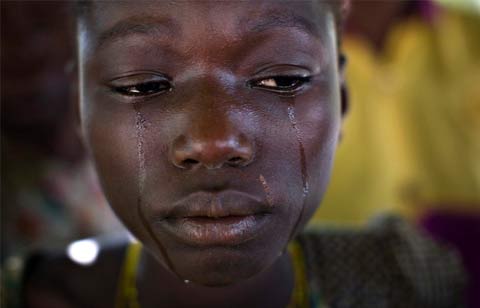
Photo: REUTERS/Finbarr O’Reilly
There are 7 Seven things I want you to know about the Democratic Republic of Congo.
- 1) World’s deadliest war: over 6 million have died since 1997.
- 2) Armies and Militia are safe havens and business opportunities for criminals, gangs, thieves, rapists, confused and angry adults and children.
- 3) The Congo is one of the leading countries in the world in the number of child soldiers.
- 4) Extremely merciless exploitation of women and children take place every single day, leading to death.
- 5) Wars and related violent activities, malnutrition, starvation, and lack of nationalism are the main killers in the Congo.
- 6) Over 13 million orphans and abandoned children live in the Congo.
- 7) The Democratic Republic Congo is one of the wealthiest countries in the world in terms of natural resources, but its inhabitants rank among the poorest and most exploited in the world.
Right now there’s a war taking place in the heart of Africa, in the Democratic Republic of Congo, and more people have died there than in Iraq, Afghanistan, and Darfur combined. [This latest war is reported to have started in April 2012 after M23 rebel forces (larger, better equipped and more organized) seized control of the eastern city of Goma from President Kabila’s forces. Philip Gourevitch of The New Yorker writes, “Most of the international press coverage of this latest war in the east, which began in April, has focused on allegations in a U.N. report that neighboring Rwanda was behind M23.”]
So let us now consider our African leaders, with special attention to Angola, Algeria, Burundi, Sudan, Cote d’Ivoire, Liberia, Nigeria, Democratic Republic of Congo, Rwanda, Uganda, Zimbabwe, Ethiopia/Eritrea and Sierra Leone whose countries are involved in some form of civil war and unrest internally and who are somehow connected to this war as well. In fact, at least seven of them (specifically Uganda, Burundi, Sudan, Nigeria, Rwanda, Zimbabwe and RDC according to The United Nations) have helped fuel the war in Congo either indirectly or directly by aiding in military manpower or money to fund weapons. The crisis in the Democratic Republic of Congo (DRC) is by far the worst human disaster in the world today.
Not to mention the death toll in the DRC being one thousand times greater than the numbers coming out from the Israeli / Palestinian conflict. If this scale of destruction was in any other nation it would be coined “World War 3”.
In my opinion, this is the most deadly conflict since World War II. To understand what is happening here, you have to go back more than a decade, when the genocide that claimed nearly a million lives in neighboring Rwanda spilled over into Congo. Since then, the Congolese army, foreign-backed rebels, and home-grown militias have been fighting each other over power and control of this land, which has some of the world’s biggest deposits of gold, copper, diamonds, and tin. The United Nations was called in and today their mission is the largest peacekeeping operation in history… all to no avail.
The Victims
Within the last ten years, more than six million people have died and the numbers keep rising.
Each new battle is followed by pillaging and rape; entire communities are terrorized and forced to flee from their homes, people take whatever they can, and walk for miles in the desperate hope of finding food and shelter. Over the last year, more than 500,000 people have been displaced. A fraction of them make it to cramped camps, where they depend on UN aid to survive.
The Democratic Republic of Congo’s President, Joseph Kabila has pledged to allow himself to be guided only by the general interest, “the respect of human rights and to concentrate all his efforts to promote common well-being and peace”. This remains to be seen.
People in the Democratic Republic of Congo expect very little from the state, government and civil servants. The citizens of DR Congo pray to be delivered from the brutal militias that still control the eastern provinces, where rape has become so common place that a senior UN official called the country “the rape capital of the world”. On the political front, President Joseph Kabila has shown much more interest in regime consolidation than implementing his development agenda.
Poor leadership is a major problem for DR Congo and there are few figures on the political landscape with a vision to bring stability to this embattled nation. THE DRC is leaders able to bring an end to corrupt government, reduce poverty, solve the country’s security problems and improve the well-being of ordinary people. They have no master plan for reform. They do not share a common vision and often implement contradictory programmes. Whatever accountability there is in DR Congo is directed towards international backers, not the Congolese people. Congolese authorities have abdicated from the development agenda. Fighting has broken out once again in eastern Congo and the region threatens to slip into all-out war.
The Women
The most frequent targets of this hidden war are women. It is, in fact, a war against women, and the weapon used to destroy them, their families and whole communities, is rape.This is not rape because soldiers have gotten bored and have nothing to do. It is a way to ensure that communities accept the power and authority of that particular armed group. This is about exercising terror. This is about using RAPE as a weapon of war.
In eastern Congo, the prevalence and intensity of rape and other sexual violence is described as the worst in the world. The war has made the life of women more precarious. Violence against women seems to be perceived by large sectors of society to be normal.
For years there have been armed groups fighting in this region; thousands of men emerge from the forest to terrorize villages and steal women. Congo’s government seems unable or unwilling to stop them and there’s little evidence that top Congolese officials take the problem seriously. The fact is that the justice system is on its knees in Congo. Although this system is weakened internally, there are organizations trying to help rape survivors get back on their feet. However that is not enough because the problem is too grave for pockets of intervention.
What we need is a united force to end the turmoil in the Congo.
The Children
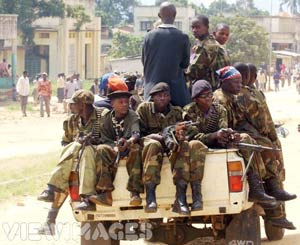 Few people are aware of the unimaginable scale of human suffering, death, and destruction that has occurred in this vast country deep in the heart of Africa. In the aftermath of this brutal war, children have endured the brunt of the suffering. The children of Congo have been so badly affected by the devastation caused by continued fighting in North Kivu province, eastern Democratic Republic of the Congo, that they constantly remain at risk of abuse and exploitation by armed groups.
Few people are aware of the unimaginable scale of human suffering, death, and destruction that has occurred in this vast country deep in the heart of Africa. In the aftermath of this brutal war, children have endured the brunt of the suffering. The children of Congo have been so badly affected by the devastation caused by continued fighting in North Kivu province, eastern Democratic Republic of the Congo, that they constantly remain at risk of abuse and exploitation by armed groups.
The longer children remain displaced, the greater the risk that they will be left unprotected. These children are extremely vulnerable because they’re displaced from their homes, they don’t have the protection of their communities, the protection of the schools – and they’re out in the open.
There are now some 250,000 children living on the streets in the Democratic Republic of Congo.The plight of street children in Congo has grown as a result of parental deaths, children and families displaced by war, child soldiers who have been ejected from their homes and who cannot return home.
One of the Democratic Republic of Congo’s ugliest of legacies – is the use of child soldiers. There is an estimated 30,000+ children filling in the ranks of the militia and the fragmented Congolese army.
In 2006, the U.S. Department of Labour listed Congo as the country with “The Worst Forms of Child Labor.” Shame the United Nations, whose website on the Congo mentions nothing about child labor. It is a shame indeed when a country is guilty of allowing criminal elements to enslave its young children.
Thousands of children, between the ages of three and ten years old, combine to form a massive child labor force to dig for coltan, also called black gold, in the militia controlled and operated mines in the Congo.
More than two million children have died in the past ten years from mine related accidents there. In the Congo, a missing or dead child is disregarded like a foul thought. The earnings from coltan are more important than the life of a scraggly child. And the Government pretends this is not happening. It is a country’s shame when a child is forced into work, but it is a bigger shame when a child dies because of that work and no one notices, not even the Government.
Every day millions of children in the DRC are forced to crawl into underground mines on their hands and knees to dig for the essential raw material, coltan, for the manufacturing of electronic gadgets like cell phones, iPods, laptop computers, play stations, wireless systems, DVD players, blackberries and pagers.
So I say, DR Congo is on artificial life-support system. While DR Congo is clearly a failed state, the general Congolese society has not failed. On the contrary it is strong, vibrant, dynamic, tolerant and generous. However, we cannot build a state in a culture of treachery, lies and terror, of militarization and the flagrant violation of human freedoms. Our greatest need for the Nation is for our leaders to develop a sense of “love for country” and for us as a people to be given a chance by those who are holding the region hostage to try to rebuild our nation and bring peace to our country.
The Plea
Our misery, our suffering, our humiliations are not irreparable. We must begin to help ourselves collectively instead of selfishly. This is the only solution to our African problems. When we solve war we solve illiteracy, when we solve illiteracy we solve poverty … when we solve poverty we solve corruption … these are the greatest of our Nation’s problems.
Peace starts at home, peaceful living, respect for others, good education and economics, great family values and connections, all contribute toward National Peace.
Hopes for positive change will come from the people, not from the Congolese political establishment. In order for us to establish country peace we must be inspired to survive and groom supportive elites to continue siphoning Africa’s peace policies and most of all we must unite ourselves with our brothers and sisters in America to help us over come this Third Congo War (also known as “The Last War of Africa”) which officially began in 2008. By 2009, the war and its aftermath had killed 2.4 million people.
People in the Congo are still dying at a rate of an estimated 45,000 per month. Reports indicate that almost half of the individuals killed are children under the age of 5. The conflict in the DRC continues to be the worst humanitarian crisis in the world.
I am here today to extend a national call to the churches, which I believe God has laid on my heart to do. The DRC of Congo is in a state of emergency. It is urgent that African Americans understand the plight of the Congolese people and feel it a moral duty to look into the situation in our country, not only Congo but Africa as a whole because Africa is their homeland.
It was said by Alvin Toffler that, “The illiterate of the 21st century will not be those who cannot read and write, but those who cannot learn, unlearn, and relearn.” — and we learn best by observation. Jesus was an observer. He traveled the world observing the people so that he could best know how to help them, let us today observe the plight of Africa and its inhabitants and see how we as children of the land can best help them.
Thank you
PHOTOS
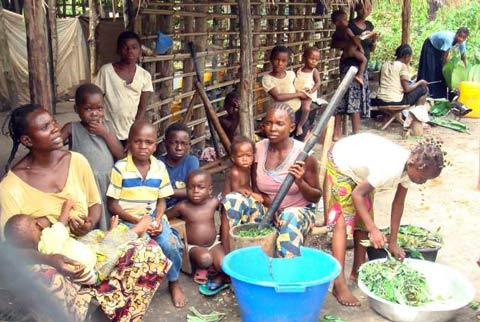
Women and children find shelter in a village in the Republic of Congo after fleeing from Equateur province. © UNHCR/B.B.Diallo
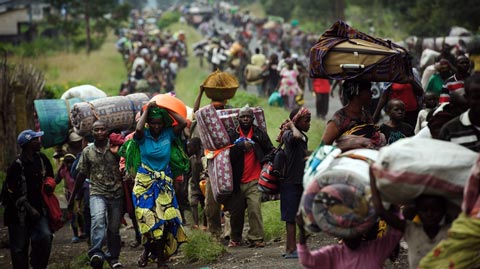
To escape fighting, thousands of civilians flee the town of Sake in the eastern part of the Democratic Republic of the Congo on Thursday. Rebels captured Sake and made other advances in the area this week. Eastern Congo and the larger region have been the scene of frequent fighting over the past two decades. (AFP/Getty Images)
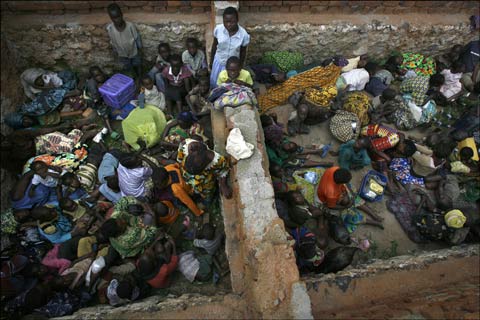
Congolese people displaced by the latest fighting seek refuge near the UN base in the village Kiwanja, 90 kms north of Goma, eastern Congo. November, 2008. AP/Jerome Delay
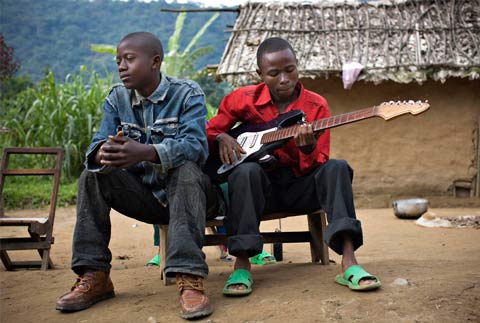
A man plays an electric guitar in the village of Pinga, a village with no electricity, in eastern Congo, February 7, 2009. (REUTERS/Finbarr O’Reilly)
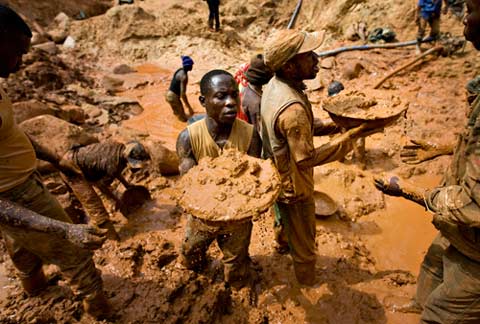
Gold miners pass mud along a human chain in an open pit at the Chudja mine in the Kilomoto concession near the village of Kobu in north-eastern Congo, February 23, 2009. (REUTERS/Finbarr O’Reilly)
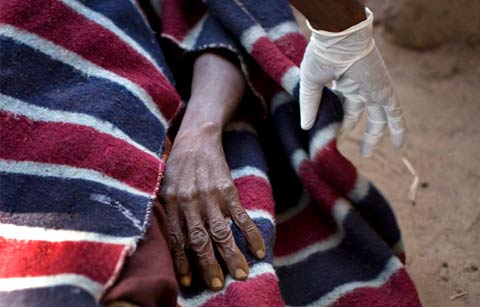
A Red Cross worker covers the the body of Dieudonne Kulimbo who was shot and killed in the bush near Dungu in northeastern Congo, February 17, 2009. (REUTERS/Finbarr O’Reilly)
***
CALL TO ACTION
- Call the office of Congresswoman Karen Bass (D-CA) and tell them you are calling to support the cause for the DRC. Tel. 202.225.7084
- Atlanta Walk for Congo:click here for more information

i will rather call this a proxi war because in my point of view this war is being fuel by foreign powers.when it"s come's to personal interest people are ready to sleep with the devil just to get what the want.
the united nation is just a machinery put in place by this very people who fuel this war just to protect their personal interest not minding the moral part of life civilian dead children women and so on.to conclude i will say natural resources are far more a curse rather than a blessing.may God bless and protect the people of the war turn democratic republic of Congo
Heart breaking to see the life of African people these days. The war happening in the country is making their life worse. They don’t have food, shelter and medicine. All they now have is hunger, famine and poverty. Hope various nations and organizations will look up on this issue as soon as possible.